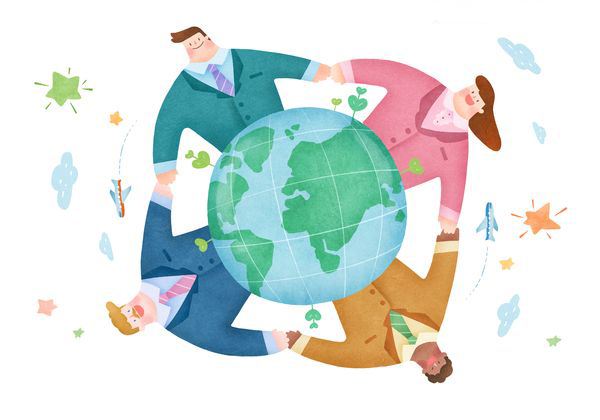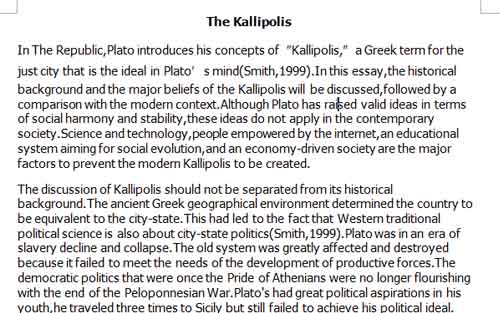本文是一篇关于全球化的Essay代写范文,主要讲述了什么是全球化。范文内容和格式由致远教育整理发布,仅供留学生参考学习,如有essay代写需求,请扫描右侧二维码联系网站客服。

Globalization is a dynamic process that involves the cultural, social, and political integration of communities worldwide. It is a process that breaks borders and allows for the exchange of the key aspects of live without any stringencies. While the concept of globalization has taken center stage in recent years, it is a phenomenon whose roots can be traced centuries back during the exploration era. With the astronomical improvement in transport and communication, exchange of cultures has become more prevalent amplifying the effects of globalization. These effects have been observed as both positive and negative. The dynamic nature of globalization, free of control from any formal organization, makes it an intriguing yet complex phenomenon. Globalization has consistently been catalyzed by the various cultural and technological revolutions over human history. With the prevalent technological revolutions, the world will increasingly become an even smaller and seamless community with multiple cultures intertwined into one. Despite proven negative consequences associated with globalization, it remains a vital part of human advancement that allows for improved living standards through prudent exploitation of available resources.
全球化是一个动态的过程,涉及到世界各地社区的文化、社会和政治融合。这是一个打破边界的过程,允许在没有任何限制的情况下交换live的关键方面。虽然全球化的概念近年来已占据中心地位,但它是一种现象,其根源可以追溯到几个世纪前的探索时代。随着交通和通讯的飞速发展,文化交流越来越普遍,扩大了全球化的影响。这些影响既有积极的一面,也有消极的一面。全球化的动态性,不受任何正式组织的控制,使它成为一个有趣而复杂的现象。全球化一直受到人类历史上各种文化和技术革命的推动。随着普遍的技术革命,世界将越来越成为一个更小、更无缝的社区,多种文化交织在一起。尽管事实证明全球化带来了负面影响,但它仍然是人类进步的重要组成部分,通过审慎利用现有资源,提高生活水平。
The fact that globalization is an unregulated process is one of its most appealing characteristics. Without regulation, there is limited chance of exploitation. Globalization is largely a positive externality of positive technological advancement. As such, formal global organization have very little control in the process, ensuring it remains free from bureaucratic and capitalist interests. With globalization, thousands of cultures across the world have the opportunity to interact and in the process adopt what is positive all-the-while discarding the negative (Fei 2015, p. 160). Perceptions are constantly being changed as a result of globalization. Through interaction among different cultures, people are able to make informed perceptions about other cultures depending on their experiences as opposed to hearsay and other predetermined dispositions. Transport and communication advancements have made it increasingly easier for people to traverse the world as well as communicate seamlessly across continents. In the process, prejudices are constantly being challenged, and in its place, a more culturally sensitive populate is borne. This argument is however challenged by the fact that cultural erosion is a real and actual consequence of globalization (Fei 2015, p. 166). Individuals, especially from minority cultures such as native populations in the United States, Canada, and Australia are increasingly abandoning their indigenous cultures and becoming part of the majority cultures. Individualism is lost in the process resulting in a less diverse global population. However, despite the exposure of different cultures to erosion, perceptions are equally changed for the better in the process. Minority races are exposed to less prejudice and discrimination due to the increased interactions stemming from globalization.
全球化是一个不受管制的进程,这是它最吸引人的特点之一。没有监管,剥削的机会有限。全球化在很大程度上是技术进步的正外部性。因此,正式的全球组织在这一过程中几乎没有控制权,确保它不受官僚和资本主义利益的影响。随着全球化的发展,世界上成千上万的文化有机会相互影响,在这个过程中采用积极的一面,摒弃消极的一面(Fei 2015,第160页)。由于全球化,人们的观念正在不断地改变。通过不同文化之间的互动,人们能够根据自己的经历而不是传闻和其他预先确定的倾向,对其他文化做出知情的感知。交通和通讯的进步使人们越来越容易穿越世界,也使跨洲的无缝通讯变得更加容易。在这个过程中,偏见不断受到挑战,取而代之的是一个更具文化敏感性的群体。然而,文化侵蚀是全球化的真实和实际后果这一事实对这一论点提出了挑战(Fei 2015,第166页)。个人,特别是来自少数民族文化的人,如美国、加拿大和澳大利亚的土著居民,越来越多地放弃他们的土著文化,成为多数文化的一部分。个人主义在这个过程中消失了,导致全球人口的多样化程度降低。然而,尽管不同文化受到侵蚀,但在这一过程中,人们的观念也同样发生了变化。由于全球化带来的互动增加,少数民族受到的偏见和歧视较少。
The strong correlation between globalization and technological advancement offers invaluable advantages to the global economy. Through the exchange of ideas and technologies, developing countries are able to better their economic systems over a shorter span than their developed counterparts. As a result, people living in these nations are bound to have access to better standards of living to the exchange of production technologies that are more efficient and prudent. Globalization also allows all nations with the competitive advantage to access global markets which exponentially improves the financial returns on their capitals of production (Samimi & Jenatabadi 2014, p. 2). Market forces can now take place on a global scale, pushing production in developing countries while increasing consumption in the developed nations and vice versa through international trade (Gurgul & Lach 2014, p. 5). All the factors considered, globalization provides developing countries with the right platform to accelerate their development. Standards of goods and services are equally heightened as the global competition pushes out substandard products from the global market. As a consequence, the global population consumes products of better standards which consequently amplifies their standards of living. Additionally, with globalization, international organizations such the United Nations are able to put measures in place that avert human suffering by rallying for the collective input of all major global players. Famine in sub-Saharan Africa is less likely to be fatal to due to global contributions from other parts of the world. Disease outbreaks can be better managed and contained through cross border efforts; all possible as due to globalization (Ritzer 2008, p. 683). While all these benefits are welcome, it is impossible to overlook the counter effects. Developing nations are constantly being exploited for their untapped natural capital by the developed nations. Also, these nations have become dumping grounds for outdated technologies. The gap between the rich and the poor has equally widened due to globalization, as few individuals continue to control the factors of production (Gurgul & Lach 2014, p. 2). Samimi & Jenatabadi also state that globalization may only be beneficial to high and middle-income countries (2014, p. 1). While all these issues are valid and unfortunate, they are more of a consequence of capitalism, with globalization only amplifying their effects.
Political globalization contributes towards human advancement through improving the standards of governance globally. By definition, political globalization, an element of globalization, refers to the growth of a global political system (Ritzer 2008, p. 414). In essence, the process involves the accumulation of power by a single international organization of governance. The United Nations mentioned easier is an example of a product of political globalization. One of the roles of political globalization in protecting human rights across the globe is through the standardization of governance (Ritzer 2008, p. 415). Using the example of the United Nations provided which has over 185 member states, the organization has stipulated some regulations that each of the member states must abide to. Part of the strategy of the organization is offering incentives for members, and through the incentives, regulate policies and actions of the member governments in their individual nations. Part of the key mandates of the United Nations is maintaining global peace and preventing the outbreak of another world war (Ritzer 2008, p. 681). In this mandate, member states are required to observe and respect the sovereignty of other member state contrary to which the organization, through its resources and that of its other members will take the required measures against the nation that contravenes the regulations signed. In light of such measures arising from the political globalization, it is evident that the political balance of the world rests on such organizations which wield enough power to deter oppressive leaders from interfering with the basic rights of other nations as well as its own citizens. The case of the Rwandan genocide is frequently highlighted in the role of such global political organization in preventing conflicts and atrocities even within a country’s borders. Other organizations such as the International Criminal Court all serve to protect mass human rights across and within the borders of its signatories. Despite arguments that global superpowers may often be conferred special treatment by such global organizations, their role in protecting the welfare of global citizens remains unprecedented.
While for the most part globalization is often viewed as a product of improved transport and communication technologies, the phenomenon also aids in the advancement of the said technologies. In the process, it is results in a symbiotic relationship where both technological advancement and globalization; as two two distinct phenomena, are intertwined. Over the years, globalization has created a conducive environment in which talents from all over the world can be seamlessly tapped for further enhancement of technology. Brain drain, a concept which is loosely defined as the migration of unique talents from one country to another, eased by globalization, as enabled the concentration of great minds towards the further advancement of technology. In this digital age, innovation and invention are highly sought after traits (Weresa 2014, p. 21). The ability of globalization to mate the genius minds to nations with the required resources has brought brought significant technological progress which cannot be ignored. While the countries from which the personnel migrate from might face limitations in human resources, the entire world stands to gain if these talents are provided with the necessary resources to fully exploit their capabilities. Without these resources, a lot of such talents would remain untapped. This argument is closely associated with role that globalization has played in enhancing the efficacy of resource exploitation. With improved technologies, natural resources are extracted and exploited in a more sustainable manner, reducing wastage and enhancing environmental sustainability.
In retrospect, it is clear that while globalization remains an integral part of human advancement, it also results in a fair share of negative consequences. Globalization has brought about the interaction and integration of different cultures of the world, and in the process reducing prejudice and biased predispositions. Additionally, globalization has played a significant role in growing the global economy. Both developing and developed nations have benefited from cross boarder commerce that has been enhanced by improved transport and communication networks. As a result, the general welfare of the world’s population has improved during to improved economic tidings. Global political stability and technological advancement too have benefited from globalization. By uniting the world, globalization has ensured the human race remains a united front in addressing key issues affecting us as a race. In doing so, the world stands a greater chance of succeeding as opposed to addressing these same issues individually. Such is why globalization, despite any negative effects, remains a formidable force in sustaining human advancement.
Reference List
Fei, X., 2015. Globalization and cultural self-awareness. Springer Berlin Heidelberg.
Gurgul, H. and Lach, Ł., 2014. Globalization and economic growth: Evidence from two decades of transition in CEE. Economic Modelling, 36, pp.99-107.
Ritzer, G., 2008. Political Globalization. In The Blackwell Companion to Globalization. Oxford, UK: Blackwell Publishing Ltd, pp. 414–428.
Samimi, P. and Jenatabadi, H.S., 2014. Globalization and economic growth: Empirical evidence on the role of complementarities. PloS one, 9(4), p.e87824.
Weresa, M.A. ed., 2014. Innovation, Human Capital and Trade Competitiveness: How Are They Connected and Why Do They Matter?. Springer Science & Business Media.










